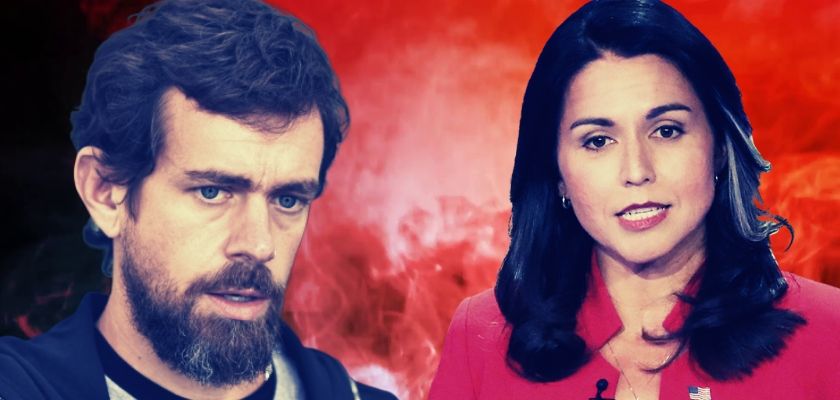In mid-June, reports said Twitter CEO Jack Dorsey was so impressed by Representative Tulsi Gabbard’s performance during the initial Democratic debates earlier in the month – that he donated the maximum allowed amount – $5,600 – to the congresswoman.
It’s now the end of July, and Gabbard, a Democratic maverick and presidential hopeful, is suing Google for illegally blocking her from buying ads in the critical hours in the wake of those June debates.
And in a tweet today, she panned Big Tech in general as “a danger to our core American values of free elections.”
Click here to display content from X.
Learn more in X’s privacy policy.
Considering that Dorsey is a prominent and important figure in the Big Tech club that runs a company that’s trigger-happy with the censorship trigger, it would be interesting to know how he feels today about this candidate, and about the decision to “endorse her with his wallet.”
Of course, Gabbard’s extreme clarity when it comes to her stance regarding the role of tech and social media giants is nothing new.
Gabbard, who left the Democratic National Committee (DNC) over corruption in her party ahead of the US presidential elections in 2016 so she could endorse Bernie Sanders over Hillary Clinton, recently spoke to Joe Rogan about a wide range of issues, including negatively about tech platforms and relevant issues of free speech and privacy.
In her Rogan interview, Gabbard also touched on a spate of user bans handed down by Facebook, and Twitter itself.
And in her lawsuit against Google, the presidential candidate warned that given the company’s influence and power, it could well “impact political discourse.”
“Conflicted and mysterious”
Given her unchanged and clear stance on this and many other issues, it’s truly rich of Vanity Fair to call Gabbard’s policies “ideologically conflicted” and “mysterious” – while in the same breath reporting about Dorsey’s donation.
What’s ideologically and otherwise conflicted, not to mention mysterious, is Dorsey himself, clearly inspired by Gabbard’s showing in the early debates to the point of supporting her campaign with a maximum allowed donation – while at the same time falling over himself to prove that he is of the same stock as the rest of the Big Tech that Gabbard severely criticizes.
Just last week, Dorsey told his investors that Twitter would tighten the screws around free speech ahead of the presidential campaign as the protector and (self?) appointed arbiter of nothing less than the integrity of the democratic process, i.e., the related conversation and debate.
He announced Twitter’s war on “misinformation” going forward – however, misinformation may be defined, once it’s defined – and a brand new feature right now: adding “a warning label” on government officials’ tweets that somehow manage to break Twitter’s rules – without actually warranting a ban.
No names were named, but major media outlets gleefully interpreted this measure to mean Dorsey was “finally” doing something to silence President Donald Trump.
The very same Vanity Fair that now scrutinizes the Twitter CEO for his donation to Gabbard, said at the end of June that he was laying the groundwork to “finally censor Trump’s deranged posts.”
Media’s dislike of Gabbard and patience with Dorsey
It’s hard to tell whether the latest article is a hit piece aimed at Gabbard as the dangerous outsider whose common-sense policies might propel her to play a significant role in the upcoming elections – or against Dorsey as that Silicon Valley boss who has not yet proved himself in the censorship and political bias department quite to the degree his peers have.
But these two are incompatible figures – one firmly on the side of free speech and fair and transparent social media, the other doing what he can (but apparently not enough just yet!) to make sure social media are steered in the other direction.
Gabbard, a US Army veteran with the rank of major who served in the Middle East, is being called out for being “anti-interventionist” – as if that’s a bad thing.
A woman elected to Congress as a Democrat four times in landslide votes is being painted through offhand remarks as a darling of the conservatives – again as if that was a bad thing.
Dorsey, meanwhile, is still being handled with kid gloves, although his apparent reluctance to engage in full-on censorship on Twitter seems to be testing the patience of many.






















